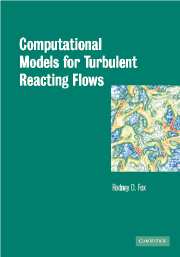Book contents
- Frontmatter
- Contents
- Preface
- 1 Turbulent reacting flows
- 2 Statistical description of turbulent flow
- 3 Statistical description of turbulent mixing
- 4 Models for turbulent transport
- 5 Closures for the chemical source term
- 6 PDF methods for turbulent reacting flows
- 7 Transported PDF simulations
- Appendix A Derivation of the SR model
- Appendix B Direct quadrature method of moments
- References
- Index
7 - Transported PDF simulations
Published online by Cambridge University Press: 07 December 2009
- Frontmatter
- Contents
- Preface
- 1 Turbulent reacting flows
- 2 Statistical description of turbulent flow
- 3 Statistical description of turbulent mixing
- 4 Models for turbulent transport
- 5 Closures for the chemical source term
- 6 PDF methods for turbulent reacting flows
- 7 Transported PDF simulations
- Appendix A Derivation of the SR model
- Appendix B Direct quadrature method of moments
- References
- Index
Summary
In Chapter 6 we reviewed the theory underlying transported PDF methods. In order to apply this theory to practical flow problems, numerical algorithms are required to ‘solve’ the PDF transport equation. In general, solving the PDF transport equation using standard finite-difference (FD) or finite-volume (FV) methods is computationally intractable for a number of reasons. For example, the velocity, composition PDF transport equation ((6.19), p. 248) has three space variables (x), three velocity variables (V), Ns composition variables (ψ), and time (t). Even for a statistically two-dimensional, steady-state flow with only one scalar, a finite-difference grid in at least five dimensions would be required! Add to this the problem of developing numerical techniques that ensure fU, φ remains non-negative and normalized to unity at every space/time point (x, t), and the technical difficulties quickly become insurmountable.
A tractable alternative to ‘solving’ the PDF transport equation is to use statistical or Monte-Carlo (MC) simulations. Unlike FV methods, MC simulations can handle a large number of independent variables, and always ensure that the resulting estimate of fu, φ is well behaved. As noted in Section 6.8, MC simulations employ representative samples or so-called ‘notional’ particles. The principal challenge in constructing an MC algorithm is thus to define appropriate rules for the rates of change of the notional-particle variables so that they have statistical properties identical to fU,φ(V, ψ; x, t). The reader should, however, keep in mind that the necessarily finite ensemble of notional particles provides only a (poor) estimate of fu, φ. When developing MC algorithms, it will thus be important to consider the magnitude of the estimation errors and to develop ways to control them.
- Type
- Chapter
- Information
- Computational Models for Turbulent Reacting Flows , pp. 328 - 362Publisher: Cambridge University PressPrint publication year: 2003



